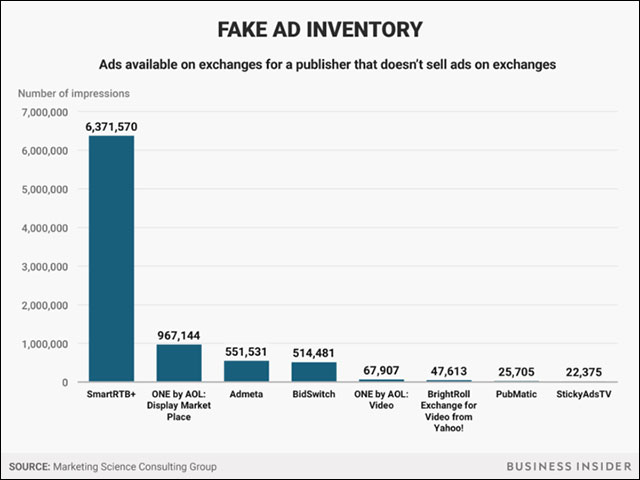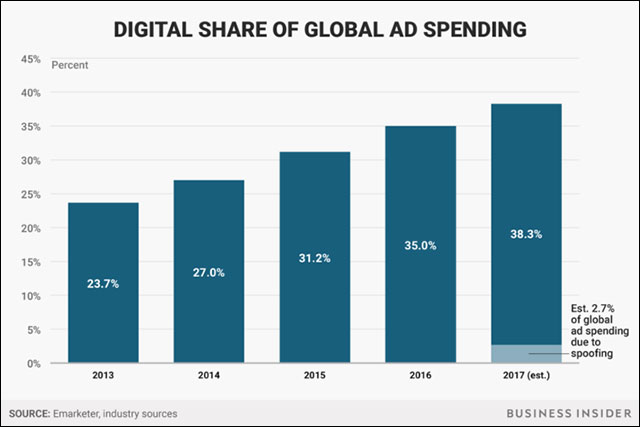Google secretly checks fake ads, resulting in many people worrying
With the help of technology giants, Google is at the forefront of this. The company has launched an initiative called ads.txt with the goal of eliminating fake ads, called 'spoofing'. This term describes many ways that advertisers may be tricked into paying for positions they never received. For example, crooks can buy an inexpensive ad placement from a low quality site, then deliberately evaluate it as a reputable site position, such as CNN, and sell it at a high price. than. That ad is never displayed on CNN.
This is done because of the popularity of automated advertisements, meaning that it is placed on the page by algorithm and purchased via exchange instead of directly negotiating with the website owner.
This type of scam also affects sites that don't sell ads in automated forms. Some sites say that they hear information that many people need to advertise saying that their ads are being sold in the advertising market, even though these companies do not work anywhere like that. .
Google conducted the test
In order to understand the situation, Google has quietly performed many well-known newspaper pages, including NBCU, CBS and The New York Times. In these tests, Google and partners turn off all automated ads for a short time, such as 10 to 15 minutes, and then see what the sales market is selling. Google and partners have discovered thousands, not to mention millions of videos and ads displayed (in flash, images .) are still available in many places, although they are not actually sold during the time. that point.
These places include AdEx of Google, AppNexus or Oath's PubMatic BrightRoll. Google also discovered scammers say they can sell YouTube ads in many places.
Google is not alone in this work. A technology company manager - an advertisement from another company has found fake ads on sales markets and says it is easy to find thousands of such ads. Below is the results of another search by Marketing Science Consulting Group, a company that specializes in counterfeit advertising. They found a large number of ads in just one day in April from an unnamed site. This site does not sell advertising on any advertising sales market.

A lot of advertising scams on the advertising market
Advertising trading floors have responded to this search result by pointing out their efforts to eliminate the types of advertising Google has found.
'We do not know that many large sites run such tests and find problems in our market,' the AppNexus representative said. 'We still work hard to avoid this problem. We are very supportive of ads.txt, assuming it's a way to reinforce our policies and long-standing rules. We have just created strong domain detection technology. '
'Oath has invested in proprietary technology on our platforms, including AOL's BrightRoll and ONE, to strengthen transparency and phony domain blocking,' Oath representative, owned by Verizon. , to speak. PubMatic said that they work directly with the site and do not know this issue while Smart AdServer also voices support for ads.txt and is committed to benefiting partners and ecosystems.
Fake advertising issues
According to eMarketer, marketers will spend about $ 83 billion on digital advertising in the US in 2017. And the more they spend, the greater the chance for fraudsters. Estimates, complex advertising scams can cost more than $ 16 billion this year globally.
There are many ways to scam advertising. Usually hackers outside the United States will sell ads on fake websites with 'bots' computer programs, mimic human behavior, make it look like there are real people on the website and click on the ad. Advertising scams have been around for years but now people are aware of how popular it is.

Global digital advertising costs are rising
Mike Baker, CEO of technology company - DataXu advertising said, 'In a way, it has been invading more in the past few years, accounting for between 20% and 30% of the second-tier advertising market's traffic and Level 3'.
Solution ads.txt
Google has gathered CEOs of many tech buying companies, including DataXu and Jeff Green's MediaMath Joe Zawadzki, Trade Desk. Ads.txt was born at the Tech Lab of Interactive Advertising Bureau with the support of TAG group (Trustworthy Accountability Group). This is a technology solution that helps protect the website from unconfirmed companies selling their ads through automated advertising and buying floors.
By inserting a file into the website, they can know who is allowed to sell ad space on their site and who does not. Assuming there are enough sites to implement this solution and enough buyers of ads that only buy from authenticated sellers can remove fake ads.
The great men awakened
Many of the methods offered to appeal to the online advertising industry need to be more cautious, study where to run ads and how much to pay for it, as well as who will get real money. The first is the International Advertising Association, a year ago that gave a report showing a lack of transparency in the market to buy ads. Six months ago, Facebook admitted there were many 'junk' ads, Google faced many advertisers withdrawing from YouTube when the ads were only seen in videos no one was watching.
Earlier this year, P&G Director Marc Pritchard gave a series of talks asking the advertising industry to demand more and need to clean up the 'trash-filled supply chain'. All have taken the issue of advertising fraud first.
Who will take responsibility?
Many criticisms poured on technology companies - advertising, especially because many auto advertising sales places have committed to eliminating bad sellers. In addition, many large companies do not even know who is allowed and are not allowed to sell their ads on the website. Maybe they said that they only worked with 3 trading floors but actually ran ads on 17 floors. Therefore, taking advantage of ads.txt also depends on the companies themselves.
'Initially, it required websites to proceed first,' said Art Muldoon, co-CEO of the advertising buying company Amnet. 'It is a burden and an opportunity.' 'When more ads are sold on the market than reality, it will lead to impossible purchases, unreasonable prices and your brand', Zaneis, TAG's CEO said. , 'it's a direct financial influence'.
You should read it
- ★ Warning: The fake Apple support unit calls to trick users into obtaining user information
- ★ Don't lose money on iPhone 3G 'fake'
- ★ Beware of Android scams!
- ★ New phishing toolkit discovered that makes it easy to create fake Chrome browser windows
- ★ How to protect yourself from phishing attacks via mobile phones